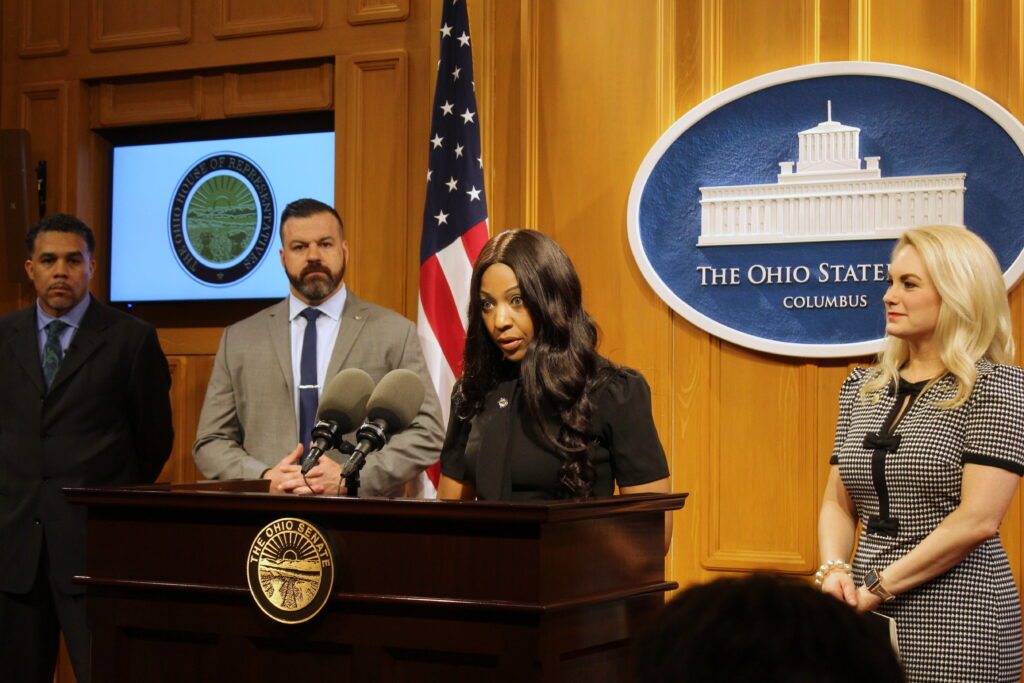Two Republican Ohio state lawmakers want to ensure kids under 16 can’t join social media apps without parental consent. They contend kids face an avalanche of content from likes and friend requests to cyberbullying and sextortion. Their proposal will help parents protect their kids, they say.
If all that sounds familiar it’s because the General Assembly tried it two years ago. The law has been tied up in the courts ever since.
But Ohio state Sen. Michele Reynolds, R-Canal Winchester, and state Rep. Melanie Miller, R-Ashland, believe a different approach, one which drives a wedge between social media companies like Meta and the Apple and Google app stores, might survive court challenges. Instead of requiring individual apps verify a user’s age, Reynolds and Miller want the app store to impose a minimum age.
“The process is simple,” Miller said. “When a parent gets their teen a smartphone, the parent can easily go into the app store and confirm, one, that they are the parent or guardian, and number two, they can confirm and verify the teenager’s age.”
The parent would verify their child’s age, she explained, with an ID or a credit card. Third party apps would receive information about a user’s age range, but no “sensitive personal information.”
“While the ‘what’ may be the same the ‘how’ is different,” Reynolds insisted.
“For too long, we’ve expected each individual app developer to create their own age verification system, leading to inconsistent protections and privacy risks,” she said.
Reynolds argued that verifying a user’s age further upstream “recognizes the central role app stores can play in empowering parents while ensuring teens have age-appropriate online experiences.”
Why would this work?
By putting the onus on app stores, Reynolds and Miller are attempting to avoid the First Amendment challenges that sunk the last proposal. A federal judge called Ohio’s initial attempt at age verification a “breathtakingly blunt instrument.”
He determined the legislation regulated the content of speech in violation of the First Amendment because it made complicated distinctions among apps. By requiring all users to verify their age and identity, the approach also infringed on the right to speak anonymously. Instead of helping parents make decisions about what their kids see, the judge added, the bill substituted governmental for parental authority.

Reynolds and Miller were at pains to distinguish their legislation.
Reynolds argued they “address constitutional concerns that have arisen with other online safety laws by applying consistently to all apps rather than just selecting a specific platform.”
“And by protecting users’ ability to speak anonymously online,” she added, “we created a framework that can withstand these legal challenges.”
Miller said, “This legislation will put parents, not the government, in charge of their children’s online access.”
It’s not clear that focusing on app stores will be enough to overcome First Amendment concerns. But it might shake up the list of supporters and opponents.
Although Ohio’s first age verification system targeted social media, it got pushback from a much broader range of internet companies because its definitions were written so broadly.
The internet trade group NetChoice led the charge against Ohio’s law, which was put on hold in February last year. The organization secured similar rulings in three other states including a permanent injunction in Arkansas just this week.
Social media companies applaud Utah’s latest bill aimed at teen social media use
But a potential rift opened up following Utah’s approval of an app-store age-verification bill earlier this year.
Meta, which owns Faceboook, Instagram and Threads, joined Snapchat and X in a statement praising the bill. Google, on the other hand, argued the legislation was “pushed by Meta and other companies in an effort to offload their own responsibilities to keep kids safe.” In a white paper, Apple said checking the ages of app store users puts too much private data online.
Google, Meta and X are all members of NetChoice. The trade group testified against Utah’s proposal, but a split among its members might make it less likely to go to court. Apple and Google, which operate the two largest app stores, can afford to hire their own attorneys, but they won’t be presenting the same united front as previous court challenges.
In addition to Utah, and now Ohio, several other states have introduced legislation that attempts to verify age at the app store level. The group Digital Childhood Alliance, which organized to lobby in favor of app store legislation, cites seven states, not including Ohio. Other publications put the number as high as 16.
According to the Wall Street Journal, Apple successfully blocked one of app store bill in Louisiana last year.
Follow Ohio Capital Journal Reporter Nick Evans on X or on Bluesky.
YOU MAKE OUR WORK POSSIBLE.
This post was originally published on this site be sure to check out more of their content







